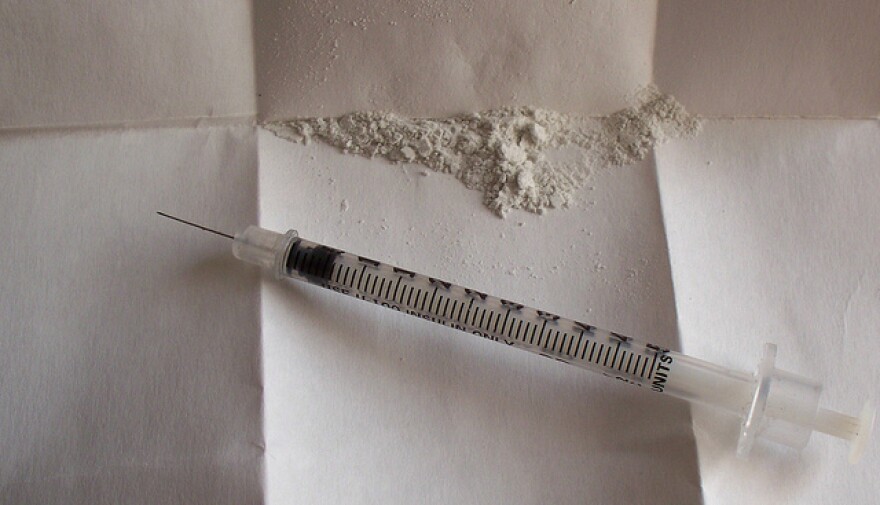Elizabeth Boccieri has been using meth and oxycontin in the past few days, ever since she heard about extra-strength laced heroin that’s been making its way south from Ohio to Louisville.
Law enforcement officials are worried that heroin laced with poison finally reached Louisville this week. Twenty-eight people have been hospitalized with suspected heroin overdoses in Louisville in the past three days, according to local hospitals. One died on Wednesday.
And while it will take weeks to for officials to determine whether the heroin is laced through toxicology testing, it’s what’s on virtually everyone’s mind who encounters the drug in some way.
“My mom is, like, begging me to not use heroin,” the 29-year-old Boccieri said. “There’s bad stuff going around. And so I’m trying to stay away from it.”
Two weeks ago, Boccieri ended her fifth stint in jail this year for heroin-related charges, she said. For 49 days, she detoxed from heroin and other drugs. But after doing hard drugs for almost half of her 29 years, the habit has become her life. She is back to living on friends couches and doing drugs.
“I never thought in a million years I’d stick a needle in my arm,” she said. “It does not discriminate.”
On Wednesday, Boccieri sat on a bench near the courthouse downtown, waiting for a hearing. Nearby, elected officials had gathered for a news conference to talk about the response to the growing heroin epidemic in the city and region.
Boccieri has overdosed six times, she said, and 20 of her friends have died from heroin overdoses, heroin-related shootings or violence. She wants to change, she said. But everywhere she goes in Louisville, she knows people who do drugs or sell them.
The news of the latest string of overdoses, she said, would likely drive heroin users to seek out the laced drug, as illogical as that may seem.
“What’s crazy when you’re dope sick, when you hear about someone overdosing, it’s like, ‘I want that dope,’” she said.
“Dope sick” is when a drug user is going through drug withdrawal and will do anything to stop having symptoms like diarrhea and paralyzing anxiety.
“I don’t want any one of my friends do it, but I just know [an overdose is] going to happen,” she said.
Spike In Suspected Overdoses
The laced heroin is making its way through the region, leaving spikes of suspected overdoses behind. It is mixed with Carfentanil, an elephant sedative, and fentanyl, a cancer drug. Carfentanil is 100 times more potent than fentanyl, and fentanyl is 100 times more potent than morphine. There’s no quality control with illegal drugs, so users usually have no idea what they’re buying.
Norton Hospital in downtown Louisville saw nine people with suspected heroin overdoses overnight Tuesday, three times as many as usual. The University of Louisville Hospital saw 11 such cases, many more than expected. At Jewish Hospital, there have been five such cases in the past three days; officials there say there are usually two a week.
Eight people got 14 doses of narcan from police on Tuesday, according to the Louisville Metro Police Department. The drug, also known as naloxone, reverses the effects of a heroin overdose. Tuesday’s figures account for a fourth of the overdoses police were called to help in the entire month of August.
The state poison control center says it has seen a 300 percent increase in calls for overdose help this year from last. And there have been 400 deaths this year from people who had fentanyl in their blood, according to the Kentucky Regional Poison Center.
A rally to stop overdoses and drug use in downtown Louisville on Wednesday brought out state and local leaders who are calling for both more funding for treatment and stronger efforts to go after the trafficking that brings heroin and other drugs into Kentucky.
Attorney General Andy Beshear is calling for more state funding for treatment. The current state budget allocates $18 million for substance abuse.
“Think about what $200 million could do,” Beshear said. “Private insurance and Medicaid may pay for 30 to 60 days in residential treatment, but if you have a heroin addiction, you’re dealing with six months of symptoms and withdrawal. If we can do basic math, it’s not enough, we have to fill that gap.”
Beshear said additional money could go toward treatment centers to fund longer stays and more staff.
In July, Congress authorized $181 million for substance abuse treatment programs through the Comprehensive Addiction and Recovery Act. The money still has to be released to government agencies to give out later this year. But the Obama administration and substance advocates say it’s not enough.
Emily Walden, with the advocacy group Kentucky Harm Reduction Coalition, said Congress should provide an additional $1.1 billion that was originally proposed but held up because CARA became a political battle, with amendments from both parties tacked on.
On Wednesday, the U.S. Department of Health and Human Services said it would distribute $53 million to 44 states in an effort to curb opioid abuse, including access to treatment and making naloxone more available.
Kentucky will get part of that money to go toward tracking fatal and nonfatal opioid-involved overdoses.









